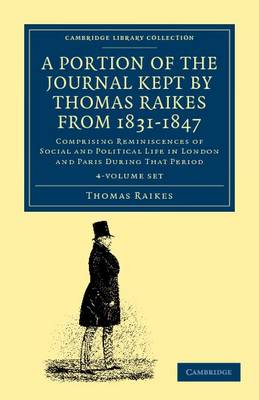Cambridge Library Collection - Travel, Europe
4 primary works • 5 total works
Volume 1
A Portion of the Journal Kept by Thomas Raikes, Esq., from 1831-1847: Volume 1
by Thomas Raikes
Published 23 February 2012
Diarist Thomas Raikes (1777-1848) was an Old Etonian whose social world included some of the most influential people of his day. Raikes was no politician - he had an established reputation as a 'dandy' - and he spent much of his time in gentlemen's clubs in London, especially the Carlton and White's. He was ostensibly employed by his father, a merchant and later governor of the Bank of England, and was married with four children. His reputation as a man about town was confirmed by the posthumous publication of these diary extracts, in four volumes from 1856 to 1857; they focus on his time abroad, mostly in Paris. Volume 1 covers the period from January 1832 to autumn 1834, a time of dramatic events in Britain and elsewhere, including the adoption of the Reform Act, uncertainty in Europe over Belgium and the abolition of slavery in the West Indies.
Volume 2
A Portion of the Journal Kept by Thomas Raikes, Esq., from 1831-1847: Volume 2
by Thomas Raikes
Published 23 February 2012
Diarist Thomas Raikes (1777-1848) was an Old Etonian whose social world included some of the most influential people of his day. Raikes was no politician - he had an established reputation as a 'dandy' - and he spent much of his time in gentlemen's clubs in London, especially the Carlton and White's. He was ostensibly employed by his father, a merchant and later governor of the Bank of England, and was married with four children. His reputation as a man about town was confirmed by the posthumous publication of these diary extracts, in four volumes from 1856 to 1857; they focus on his time abroad, mostly in Paris. Volume 2 covers the period from 1835 to mid-1836, and begins with Raikes in Paris awaiting news of the British elections, while meeting and observing diplomats, politicians and socialites from France and elsewhere in Europe.
Volume 3
A Portion of the Journal Kept by Thomas Raikes, Esq., from 1831-1847: Volume 3
by Thomas Raikes
Published 23 February 2012
Diarist Thomas Raikes (1777-1848) was an Old Etonian whose social world included some of the most influential people of his day. Raikes was no politician - he had an established reputation as a 'dandy' - and he spent much of his time in gentlemen's clubs in London, especially the Carlton and White's. He was ostensibly employed by his father, a merchant and later governor of the Bank of England, and was married with four children. His reputation as a man about town was confirmed by the posthumous publication of these diary extracts, in four volumes from 1856 to 1857; they focus on his time abroad, mostly in Paris. Volume 3 starts in mid-1836 in Paris and covers the period until autumn 1839, during which Raikes both comments on political upheaval in Britain and travels through France, Prussia and Italy, observing European society and politics.
Volume 4
A Portion of the Journal Kept by Thomas Raikes, Esq., from 1831-1847: Volume 4
by Thomas Raikes
Published 23 February 2012
Diarist Thomas Raikes (1777-1848) was an Old Etonian whose social world included some of the most influential people of his day. Raikes was no politician - he had an established reputation as a 'dandy' - and he spent much of his time in gentlemen's clubs in London, especially the Carlton and White's. He was ostensibly employed by his father, a merchant and later governor of the Bank of England, and was married with four children. His reputation as a man about town was confirmed by the posthumous publication of these diary extracts, in four volumes from 1856 to 1857; they focus on his time abroad, mostly in Paris. Volume 4 begins in 1840, with Raikes in Paris. He finally returns to England in July 1844, and re-enters London society before setting off for a brief trip to Ireland. The diary ends in 1847.
A Portion of the Journal Kept by Thomas Raikes, Esq., from 1831-1847 4 Volume Set
by Thomas Raikes
Published 23 February 2012
Diarist Thomas Raikes (1777-1848) was an Old Etonian whose social world included some of the most influential people of his day. Raikes was no politician - he had an established reputation as a 'dandy' - and he spent much of his time in gentlemen's clubs in London, especially the Carlton and White's. He was ostensibly employed by his father, a merchant and later governor of the Bank of England, and was married with four children. His reputation as a man about town was confirmed by the posthumous publication of these diary extracts, in four volumes from 1856 to 1857; they focus on his time abroad, mostly in Paris, but also in Prussia and Italy. His wide acquaintance among politicians made him a close observer of British and international political affairs, such as the Reform Bill of 1832 and the abolition of slavery in the West Indies.

